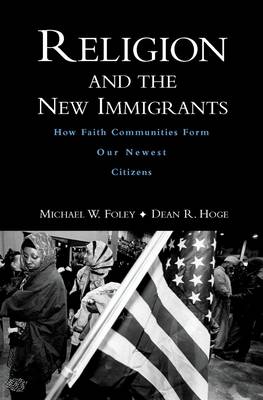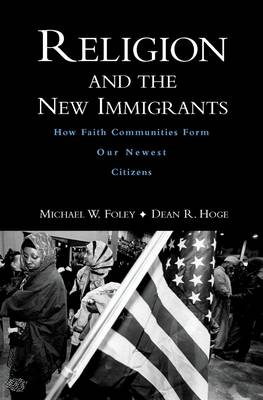
- Retrait gratuit dans votre magasin Club
- 7.000.000 titres dans notre catalogue
- Payer en toute sécurité
- Toujours un magasin près de chez vous
- Retrait gratuit dans votre magasin Club
- 7.000.0000 titres dans notre catalogue
- Payer en toute sécurité
- Toujours un magasin près de chez vous
Religion and the New Immigrants
How Faith Communities Form Our Newest Citizens
Michael W Foley, Dean R Hoge
Livre relié | Anglais
74,45 €
+ 148 points
Description
The explosive growth of the immigrant population since the 1960s has raised concerns about its impact on public life, but only recently have scholars begun to ask how religion affects the immigrant experience in our society. In Religion and the New Immigrants, Michael W. Foley and Dean R. Hoge assess the role of local worship communities in promoting civic engagement among recent immigrants to the United States.
The product of a three-year study on immigrant worship communities in the Washington, DC area, the book explores the diverse ways in which such communities build social capital among their members, provide social services, develop the "civic skills" of members, and shape immigrants' identities. It looks closely at civic and political involvement and the ways in which worship communities involve their members in the wider society. Evidence from a survey of 200 worship communities and in-depth studies of 20 of them across ethnic groups and religious traditions suggests that the stronger the ethnic or religious identity of the community and the more politicized the leadership, the more civically active the community.
The explosive growth of the immigrant population since the Local leadership, much more than ethnic origins or religious tradition, shapes the level and kind of civic engagement that immigrant worship communities foster. Catholic churches, Hindu temples, mosques, and Protestant congregations all vary in the degree to which they help promote greater integration into American life. But where religious and lay leaders are civically engaged, the authors find, ethnic and religious identity contribute most powerfully to participation in civic life and the larger society.
Religion and the New Immigrants challenges existing theories and offers a nuanced view of how religious institutions contribute to the civic life of the nation. As one of the first studies to focus on the role of religion in immigrant civic engagement, this timely volume will interest scholars and students in a range of disciplines as well as anyone concerned about the future of our society.
The product of a three-year study on immigrant worship communities in the Washington, DC area, the book explores the diverse ways in which such communities build social capital among their members, provide social services, develop the "civic skills" of members, and shape immigrants' identities. It looks closely at civic and political involvement and the ways in which worship communities involve their members in the wider society. Evidence from a survey of 200 worship communities and in-depth studies of 20 of them across ethnic groups and religious traditions suggests that the stronger the ethnic or religious identity of the community and the more politicized the leadership, the more civically active the community.
The explosive growth of the immigrant population since the Local leadership, much more than ethnic origins or religious tradition, shapes the level and kind of civic engagement that immigrant worship communities foster. Catholic churches, Hindu temples, mosques, and Protestant congregations all vary in the degree to which they help promote greater integration into American life. But where religious and lay leaders are civically engaged, the authors find, ethnic and religious identity contribute most powerfully to participation in civic life and the larger society.
Religion and the New Immigrants challenges existing theories and offers a nuanced view of how religious institutions contribute to the civic life of the nation. As one of the first studies to focus on the role of religion in immigrant civic engagement, this timely volume will interest scholars and students in a range of disciplines as well as anyone concerned about the future of our society.
Spécifications
Parties prenantes
- Auteur(s) :
- Editeur:
Contenu
- Nombre de pages :
- 288
- Langue:
- Anglais
Caractéristiques
- EAN:
- 9780195188707
- Date de parution :
- 08-02-07
- Format:
- Livre relié
- Format numérique:
- Ongenaaid / garenloos gebonden
- Dimensions :
- 236 mm x 160 mm
- Poids :
- 558 g

Les avis
Nous publions uniquement les avis qui respectent les conditions requises. Consultez nos conditions pour les avis.






